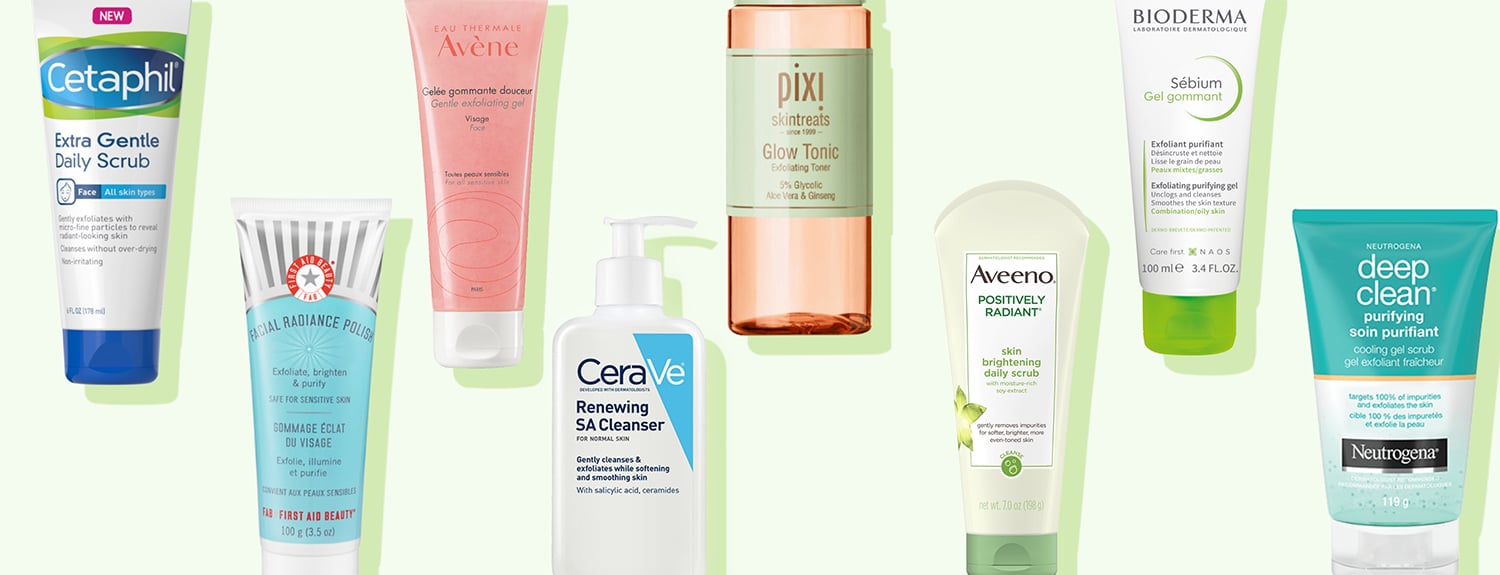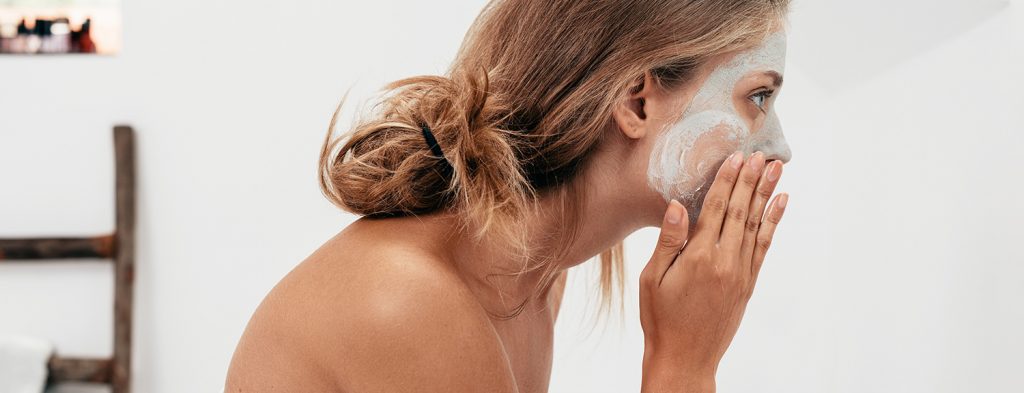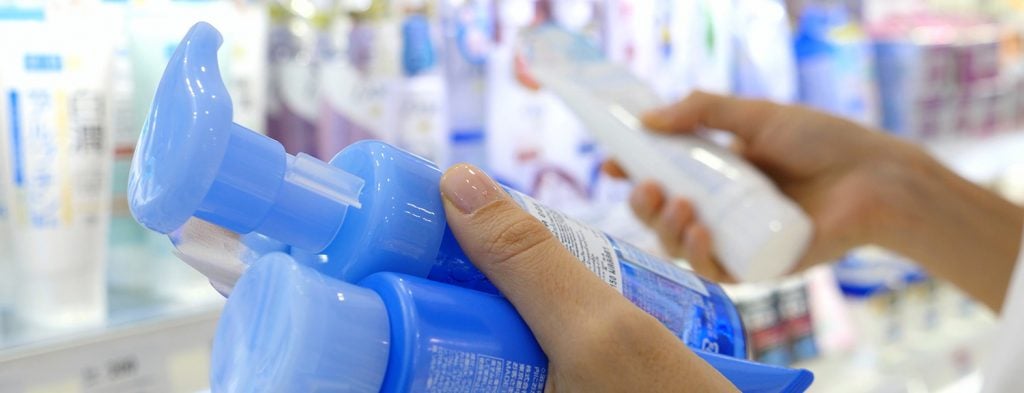The skin renews itself every 28 days, so dead skin cells are shed naturally. However, circumstances such as skin type or condition, climate, indoor heating, air conditioning, stress, medication, and health can slow down the usual desquamation phase.

When this happens, dead skin cells harbor on the surface. Not only will your complexion look dull and lackluster, but your serums and moisturizers can’t penetrate the skin, so you may feel as though they’re not working. In reality, it’s the layer of dead skin that’s standing in their way. This is why regular exfoliation is a vital part of your skincare routine.
Related: How to Exfoliate the Face
While there’s nothing wrong with using a drugstore face exfoliator, you have to do your due diligence. Take a close look at those ingredient lists to ensure you’re not purchasing a formula that contains exfoliating elements that will do more harm than good.
Related: Best Chemical Exfoliants
Best Drugstore Exfoliators: The List
BEST OVERALL
BEST: Cetaphil Extra Gentle Daily Scrub, $8
FULL LIST
L’Oréal Revitalift Bright Reveal Facial Cleanser, $5
First Aid Beauty Facial Radiance Polish, $18.75
Avène Gentle Scrub, $24
Neutrogena Deep Clean Purifying Gel Scrub, $8.99
Burt’s Bees Natural Acne Solutions Pore Refining Scrub, $9.99
Aveeno Positively Radiant Skin Brightening Exfoliating Daily Facial Scrub, $5
Acure Brightening Facial Scrub, $10
Noxzema Anti-Blemish Scrub, $10.96
Clean & Clear Deep Action Exfoliating Facial Scrub, $6
Differin Daily Deep Cleanser, $10.49
CeraVe Salicylic Acid Cleanser $22
Pixi Glow Tonic, $29
Bioderma Sebium Exfoliating Gel, $15
Drugstore Exfoliators Versus Higher-End Formulas
There are two types of exfoliants: physical and chemical (or enzymatic). While the former is the gritty, scrub-like formula you may be more familiar with, chemical (enzymatic) exfoliators are typically more effective. They can also help with additional skin concerns aside from dissolving dead cells.
“The main difference between drugstore, department store, and prescription exfoliators is the form in which they come,” explains Elle MacLeman, biochemist, skincare specialist, and head technical writer for The Derm Review. “Many conventional exfoliators are what we call physical exfoliants. Physical exfoliators are exfoliators that have beads, walnut shells, or sand. “I don’t love physical exfoliators as they cause micro-cuts in the skin, which can cause redness and irritation, and acids can disrupt the acid mantle barrier.”
Whether or not a face scrub is considered dangerous depends on what ingredients it’s formulated with. Do you remember the St. Ives lawsuit of 2017? While the case was thrown out of court in 2018, the company was under fire for its cult Apricot Scrub, which was believed to create micro-tears in the skin — a concern addressed by MacLeman.
Though the product still has a loyal following today, many other companies have opted to develop face scrubs with less abrasive ingredients such as jojoba beads, poppy seeds, oatmeal, bamboo powder, silica, fruit powders, and rice bran. Elements to avoid would be fruit pits, ground-up shells, volcanic rock, chunky salt, etc. Also, avoid plastic microbeads. They can’t dissolve in water, so they’re not doing mother earth any favors.
“My favorite way to exfoliate the skin is through enzyme exfoliators, they are gentler on the skin, and they don’t damage the skin’s natural barrier, says MacLeman. “I would stay away from harsh acids as they can damage the skin barrier as well and can exacerbate redness when misused — which is easy to do.”
How Often Should You Exfoliate?
While exfoliators themselves may not all be dangerous, over-exfoliating of any kind (physical or chemical) is. Signs you’re overdoing it include redness, itchiness, irritation, micro-tears or abrasions, flakiness, and dryness. You may even experience breakouts even if you’re not regularly acneic. As a general rule of thumb:
- Dry or Sensitive Skin: 1-2 times per week, chemical or enzymatic exfoliant preferred
- Oily or Acneic Skin: 2-3 times per week, chemical or enzymatic, mechanical only if acne breakout is not severe.
- Combination Skin: 2-3 times per week, chemical, enzymatic, or mechanical
- Mature Skin: 2 times power week, chemical or enzymatic exfoliant preferred

Related: Exfoliation: What Is It, and How Often Should I Do It?
Exfoliating Tips
While there’s no doubt that exfoliating is a crucial element to any skincare routine, these tips will ensure that your skin remains protected, hydrated, and free from damage.
- Protect: No matter which one you choose, it’s vital that you’re wearing sun protection with a minimum SPF of 30 each day, as the exfoliation process leaves the skin more vulnerable to the sun — especially from a chemical standpoint. Opt for an SPF with a minimum protection of 30. Reapply throughout the day — there are even mineral makeup powders, and SPF face sprays to make this process easier for makeup wearers.
- Be Gentle: There’s no need to use a heavy hand when exfoliating; this can lead to irritation. Use light, circular motions (avoiding the eye area) for 15-30 seconds. Don’t forget the corners of your nose, neck, and décolleté. Gentleman, don’t be afraid to work that scrub, chemical, or enzyme exfoliant into your beard and mustache, too.
- Restore: Apply a serum and moisturizer appropriate for your skin type immediately after exfoliating.
Best Drugstore Exfoliators for Face
What is the best drugstore face exfoliator? That depends on what you’re looking for.
Related: Best Exfoliators & Face Scrubs
Best Exfoliator for Dry Skin
Cetaphil Extra Gentle Daily Scrub, $8
Dry skin tends to turnover at a slower rate — especially when mature — so regular exfoliation is essential. This formula is incredibly soothing and perfect for those with dry, sensitive skin. It contains surfactants to remove excess oil, dirt, and impurities, while micro-fine granules from bamboo buff away dry, dull skin to support natural surface cell turnover. It’s also infused with hydrating ingredients like glycerin and panthenol to help maintain adequate moisture levels.
L’Oréal Revitalift Bright Reveal Facial Cleanser, $5
This cleanser and mechanical and chemical exfoliant combo contains micro-pearls and glycolic acid, which effectively slough off dead skin cells and improve skin tone and texture. Exfoliating is crucial for dry skin because it helps all of your other products (serum, moisturizer, etc.) penetrate more effectively to hydrate parched skin.
Best Exfoliator for Sensitive Skin
First Aid Beauty Facial Radiance Polish, $18.75
FAB is notorious for formulating products that cater to sensitive skin, and this mild scrub is no exception. Shea butter, oatmeal, and glycerin work synergistically to exfoliate, hydrate, soothe, and brighten gently. Unlike many other scrubs, this one is gentle enough to use every day.
Avène Gentle Scrub, $24
Exfoliating sensitive skin can be tricky, but not with this gentle scrub. Two sizes of biodegradable, non-abrasive cellulose and jojoba wax beads effectively exfoliate and refine skin’s texture minus any irritation. This formula nourishes, hydrates, and provides antioxidant protection for softer, more radiant skin.
Best Exfoliator for Acne
Neutrogena Deep Clean Purifying Gel Scrub, $8.99
This popular Neutrogena exfoliator gently yet effectively exfoliates and removes impurities while salicylic acid targets breakouts. The formula features proprietary Barriercare cleansing technology to ensure the skin remains soft and balanced versus stripped of its natural oils. It works best on oily and acne-prone skin types.
Burt’s Bees Natural Acne Solutions Pore Refining Scrub, $9.99
With the help of jojoba beads and fruit enzymes, Burt’s Bees Natural Acne Solutions Pore Refining Scrub gently exfoliates dead skin cells, prevents future breakouts, and refines the appearance of pores. This scrub also features Salix nigra (black willow) bark extract, which helps soothe the skin and aid in cell regeneration. A compound called salicin provides exceptional anti-inflammatory properties and has been shown to reduce the appearance of pores and wrinkles, even out skin tone, and increase skin firmness.
Best Face Scrub for Glowing Skin
Aveeno Positively Radiant Skin Brightening Exfoliating Daily Facial Scrub, $5
This popular, moisture-rich scrub is gentle enough for everyday use because it’s formulated with moisturizing soy extract and jojoba and castor oils. It rebalances your skin’s tone and texture and brightens dull skin. It’s also soap-free and non-comedogenic so that it won’t clog pores.
Acure Brightening Facial Scrub, $10
All skin types, except for those with inflammatory acne, can benefit from this brightening facial scrub. Sea kelp super-nutrients soften, detox, lemon peel, French green clay cleanse, and madonna lily brightens. The result is a refreshed, glowing complexion — bonus points for being 100% vegan, cruelty-free, and void of harmful ingredients.
Best Exfoliator for Clogged Pores
Noxzema Anti-Blemish Scrub, $10.96
The Noxzema brand has come a long way over the years, so you can ensure your skin will get a deep cleanse without stripping it of its natural oils. This oil-free, alcohol-free facial scrub exfoliates dead skin cells while the salicylic acid and jojoba help heal acne pimples, prevent future blemishes, and unclog pores.
Clean & Clear Deep Action Exfoliating Facial Scrub, $6
As its name implies, this scrub penetrates deep into the skin to clear pores and remove dirt, oil, and makeup, leaving behind soft, smooth skin. It’s made without plastic microbeads, and it’s gentle enough for all skin types. Bonus points for imparting a tingly, cooling sensation as you massage the product into your skin.
Best Exfoliator for Acne Scars
Differin Daily Deep Cleanser, $10.49
What’s appealing about this acne-fighting wash is that 5% benzoyl peroxide effectively targets blemishes, blackheads, and excessive oil while softening the appearance of acne scars. Additionally, a gentle non-comedogenic moisturizer is also released during the cleansing process to ensure the skin remains balanced — not dried out. It’s particularly great for those with sensitive skin who are simultaneously dealing with inflamed acne lesions.
CeraVe Salicylic Acid Cleanser $22
CeraVe’s exfoliating cleanser is a fantastic option for those with oily, acne-prone skin. It’s formulated with salicylic acid to exfoliate, hyaluronic acid to hydrate, niacinamide to fade acne scars, and vitamin D to smooth the skin.
Best Chemical Exfoliator Drugstore
Pixi Glow Tonic, $29
This award-winning cult tonic may have a cheeky name, but there’s nothing playful about this 5% glycolic formula that deeply cleanses, gently exfoliates, and promotes a radiant, glowing complexion. It’s alcohol-free, so you don’t have to worry about dryness. The addition of aloe vera provides soothing hydration, while red ginseng naturally energizes your skin.
Bioderma Sebium Exfoliating Gel, $15
A French pharmacy favorite, this power product contains both mechanical and chemical exfoliants. Gentle microbeads and glycolic and salicylic acids effectively remove dead skin cells and promote cell renewal. Antioxidants, laminaria, and vitamin E leave the skin soothed and radiant.

Best Drugstore Face Exfoliator: The Bottom Line
The skin renews itself every 28 days, so dead skin cells are shed naturally. However, circumstances such as skin type or condition, climate, indoor heating, air conditioning, stress, medication, and health can slow down the usual desquamation phase.
When this happens, dead skin cells harbor on the surface. Not only will your complexion look dull and lackluster, but your serums and moisturizers can’t penetrate the skin, so you may feel as though they’re not working. In reality, it’s the layer of dead skin that’s standing in their way. This is why regular exfoliation is a vital part of your skincare routine.
There are two types of exfoliants: physical and chemical (or enzymatic). While the former is the gritty, scrub-like formula you may be more familiar with, chemical (enzymatic) exfoliators are typically more effective. They can also help with additional skin concerns aside from dissolving dead cells.
The main difference between drugstore, department store, and prescription exfoliators is the form in which they come. Many conventional exfoliators are what we call physical exfoliants. Physical exfoliators are exfoliators that have beads, walnut shells, or sand.
While exfoliators themselves may not all be dangerous, over-exfoliating of any kind (physical or chemical) is. Signs you’re overdoing it include redness, itchiness, irritation, micro-tears or abrasions, flakiness, and dryness. You may even experience breakouts even if you’re not regularly acneic. As a general rule of thumb, one to three times a week is effective depending upon your skin type. Don’t forget to protect your skin with SPF and restore it with a serum and moisturizer for optimal skin health.



